
The TRS-80 Micro Computer System is a desktop microcomputer launched in 1977 and sold by Tandy Corporation through their Radio Shack stores. The name is an abbreviation of Tandy Radio Shack, Z80 [microprocessor]. It is one of the earliest mass-produced and mass-marketed retail home computers.

Dummy is the debut studio album by English electronic music band Portishead, released on 22 August 1994 by Go! Beat Records.

Substance is a compilation album by English alternative dance band New Order. It was released in August 1987 by Factory Records. The album compiles all of the band's singles at that point in their 12-inch versions, along with their respective B-side tracks. The then-newly released non-album single "True Faith" is also featured, along with its B-side "1963" and new versions of "Temptation" and "Confusion".
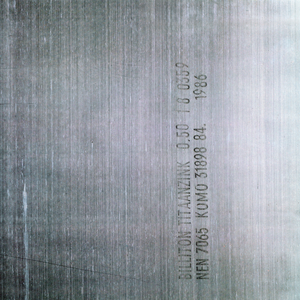
Brotherhood is the fourth studio album by the English rock band New Order, released on 29 September 1986 by Factory Records. It contains a mixture of post-punk and electronic styles, roughly divided between the two sides. The album includes "Bizarre Love Triangle", the band's breakthrough single in the United States and Australia; it was the only track from the album released as a single and as a video.
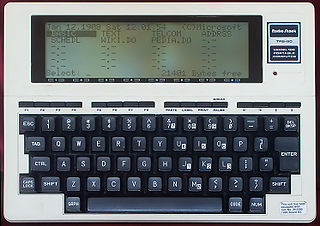
The TRS-80 Model 100 is a notebook-sized portable computer introduced in April 1983. It was the first commercially successful notebook computer, as well as one of the first notebook computers ever released. It features a keyboard and liquid-crystal display, in a battery-powered package roughly the size and shape of a notepad or large book. The 224-page, spiral-bound User Manual is nearly the same size as the computer itself.

"(You Make Me Feel Like) A Natural Woman" is a 1967 song by American soul singer Aretha Franklin released as a single by the Atlantic label. The lyrics were written by Gerry Goffin from an idea by Atlantic producer Jerry Wexler, and the music was composed by Carole King. Written for Franklin, the record reached number 8 on the Billboard Hot 100, and became one of her signature songs. It made history on the UK Singles Chart a week after her death, finally becoming a hit almost 51 years after it was first released, entering at No. 79. Franklin also included a live recording on the album Aretha in Paris in 1968.

Time Life is an American company formerly known for its production company and direct marketer conglomerate known for selling books, music, video/DVD, and other multimedia products. The current focus of the group is music, video, and entertainment experiences as the Time Life book division closed in 2001. Its products have been sold throughout North America, Europe, Australia, and Asia through television, print, retail, the Internet, telemarketing, and direct sales. Current operations are focused in the US and Canada with limited retail distribution overseas.
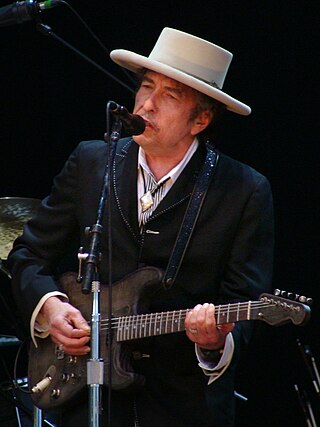
Bob Dylan is an American singer-songwriter. Often considered to be one of the greatest songwriters in history, Dylan has been a major figure in popular culture over his 60-year career. He rose to prominence in the 1960s, when songs such as "The Times They Are a-Changin'" (1964) became anthems for the civil rights and antiwar movements. Initially modeling his style on Woody Guthrie's folk songs, Robert Johnson's blues and what he called the "architectural forms" of Hank Williams's country songs, Dylan added increasingly sophisticated lyrical techniques to the folk music of the early 1960s, infusing it "with the intellectualism of classic literature and poetry". His lyrics incorporated political, social and philosophical influences, defying pop music conventions and appealing to the burgeoning counterculture.

Miss Marple's Final Cases and Two Other Stories is a short story collection written by Agatha Christie and first published in the UK by Collins Crime Club in October 1979 retailing at £4.50. It was the last Christie book to be published under the Collins Crime Club imprint although HarperCollins continue to be the writer's UK publishers.

"Glory of Love" is a 1986 song performed by Peter Cetera, which he wrote and composed with his then-wife Diane Nini and David Foster. The song was recorded by Cetera shortly after he left the band Chicago to pursue a solo career. Featured in the film The Karate Kid Part II (1986), it was Cetera's first hit single after he left the band, reaching number one on the Billboard Hot 100, and it was included on his album Solitude/Solitaire (1986), which Michael Omartian produced.
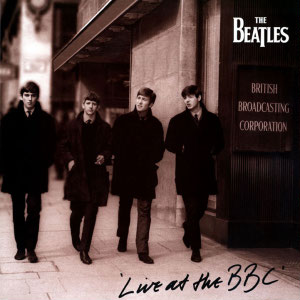
Live at the BBC is a 1994 compilation album featuring performances by the Beatles that were originally broadcast on various BBC Light Programme radio shows from 1963 to 1965. The mono album, available in multiple formats but most commonly as a two-CD set, consists of 56 songs and 13 tracks of dialogue; 30 of the songs had never been issued previously by the Beatles. It was the first official release by the Beatles of previously unreleased performances since The Beatles at the Hollywood Bowl in 1977 and the first containing previously unreleased songs since their final studio album, Let It Be, in 1970.

"Glory Box" is a song by English electronic band Portishead, released on 3 January 1995 by Go! Beat as the third and final single from their debut album, Dummy (1994). It samples "Ike's Rap II" by Isaac Hayes and peaked at number 13 on the UK Singles Chart. Additionally, the song was a top 10 hit in Iceland, while entering the top 20 in France, Ireland and Scotland.

"Hometown Glory" is the debut single by English singer-songwriter Adele, released on 22 October 2007 in the United Kingdom. The song appears on her debut studio album 19 (2008). In 2008, the song was re-released as her fourth single. Adele wrote the song within 10 minutes, when she was only 16 years old, after her mother tried to persuade her to leave her home suburb of West Norwood in London for university. "Hometown Glory" is the first song that Adele ever wrote.
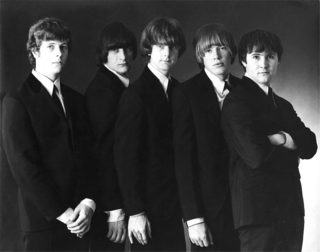
The Byrds were an American rock band formed in Los Angeles, California in 1964. The bulk of the band's releases were issued on Columbia Records or its subsidiaries, except their final studio album, Byrds, and its associated singles, which Asylum Records released in 1973. Before signing a recording contract with Columbia, the band released a single with Elektra Records in 1964 under the name the Beefeaters.

Borgen is a Danish political drama television series. Adam Price is the co-writer and developer of the series, together with Jeppe Gjervig Gram and Tobias Lindholm. Borgen is produced by SAM Productions on behalf of DR, the Danish public broadcaster, which previously produced The Killing. In Denmark, Borgen, lit. 'The Castle', is the informal name of Christiansborg Palace where all three branches of Danish government reside: the Parliament, the Prime Minister's Office, and the Supreme Court, and is often used as a stand in term for the Danish Parliament (Folketinget).

Little Mix are an English girl group that formed on the seventh series of The X Factor. They are the first group and the only girl group to win the original UK series. The lineup consisted of Leigh-Anne Pinnock, Jade Thirlwall, Perrie Edwards, and originally Jesy Nelson, before her departure from the group in 2020. Regarded as the show's most successful winning act, their success led to a girl band renaissance in the UK. Little Mix's vocals and harmonies have garnered critical acclaim and the group have been ranked as one of the best vocal girl groups. They were often dubbed, by some media, as the "biggest girl group in the world", before going on a hiatus in 2022, allowing its members to pursue solo projects.
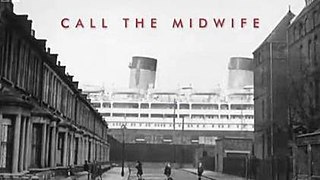
Call the Midwife is a British period drama television series about a group of nurse midwives working in the East End of London in the late 1950s and 1960s. The principal cast of the show has included Jessica Raine, Miranda Hart, Helen George, Bryony Hannah, Laura Main, Jenny Agutter, Pam Ferris, Judy Parfitt, Cliff Parisi, Stephen McGann, Ben Caplan, Daniel Laurie, Emerald Fennell, Victoria Yeates, Jack Ashton, Linda Bassett, Charlotte Ritchie, Kate Lamb, Jennifer Kirby, Annabelle Apsion and Leonie Elliott.

"Glory and Gore" is a song by New Zealand singer-songwriter Lorde from her debut studio album, Pure Heroine (2013). The song was released on 11 March 2014 as the album's fourth and final single by Lava Records and Republic Records. The track was written by Lorde and its producer, Joel Little. "Glory and Gore" is an electropop song influenced by chillwave and hip hop music. It speaks about modern society's fascination with violence and celebrity culture, comparing these to gladiators.

"Dead Eyes Opened" is a song by the experimental Australian group Severed Heads, originally released on their 1983 album Since the Accident. Upon its initial release as a 12-inch record single in 1984, the track received critical success. A remixed version released in October 1994 achieved commercial success in Australia, peaking at #16 on the ARIA Charts.

"Power" is a song released by British girl group Little Mix, featuring British rapper Stormzy. It was released as the fourth and final single from Little Mix's fourth studio album Glory Days. The remix version appears on Glory Days: The Platinum Edition, the reissue of Glory Days.




















